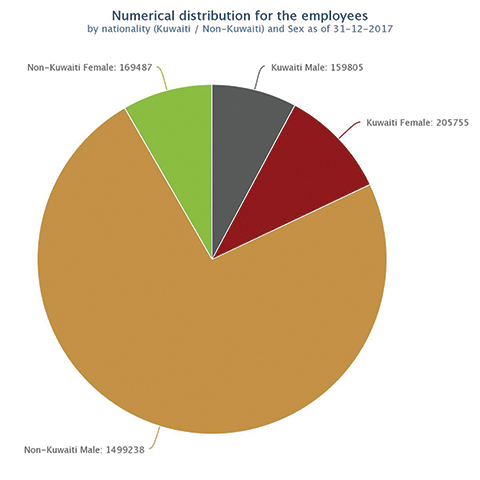 Pie chart
Pie chartKUWAIT: The number of expatriate labor forces in Kuwait increased slightly in one year according to recent statistics, but the government’s efforts to address the country’s demographic imbalance by reducing foreign laborers might have started to bear fruit as the same statistics show that expat workers’ numbers dropped within the last three months of 2017.
The total number of expat workers increased from 1,610,575 as of December 31, 2016 to 1,668,725 as of the end of 2017, according to statistics released recently by the Labor Market Information System of the Central Statistical Bureau. As a result of 58,150 foreign employees entering the local market, expats’ percentage in Kuwait’s labor market increased slightly from 81.9 percent in late 2016 to 82 percent in late 2017, while the percentage of Kuwaiti workers dropped from 18.1 percent to 18 percent within a year.
On the other hand, the statistics show that the number of expat workers dropped by around 0.3 percent in three months as they had made up 82.3 percent of the market by September 30, 2017. And while this slight drop reflects Kuwait’s ongoing efforts to reduce the number of foreign workers in Kuwait, the government continues to receive criticism and accusations of failure to push forward of the ‘Kuwaitization’ of jobs as effectively as possible.
Creating more jobs
Chairman of the parliament’s employment and public sector staff replacement committee MP Khalil Al-Saleh has meanwhile criticized the health ministry for failure to terminate long-serving expatriate employees in order to create more jobs for Kuwaiti candidates. “What harm will the health ministry suffer if it terminates the contracts of expat doctors who are over the age of 65, cannot carry out surgeries and have become administrative employees?” Saleh told Al-Rai daily. He was responding to statements made recently by Head of the Civil Service Commission (CSC) Ahmad Al-Jassar, in which he stressed that expats remain irreplaceable in the education and health ministries despite ongoing efforts to replace expatriate employees in the public sector with national manpower.
Saleh argued meanwhile that expats at the education ministry constitute a large number, adding that the ministry must carry out a good plan to ‘remedy the issue’. He said that there are still expat teachers teaching social subjects despite the availability of Kuwaiti graduates who are not accepted because there is ‘no need’ for them, yet new expat teachers are still hired for these subjects.
Saleh preferred that employment not be limited to graduates from Kuwait University’s college of education and graduates from other colleges should be accepted to become teachers, while giving incentives to those with rare specialties, adding that the education ministry must accept every university graduate who wants to be a teacher. “Our work in the committee is based on making Kuwaitis replace expats in state departments, especially if there are Kuwaitis who can do what others are doing,” he said, adding that it is no longer acceptable to appoint expats in administrative jobs, and only expats the country needs should remain.
Jasser had stated earlier this week that 2,595 unemployed Kuwaiti citizens have rejected jobs that the CSC have nominated them for as of the end of 2017, but did not specify which kind of jobs were offered.
Postgraduates’ visas
Meanwhile, an official source at the Public Authority for Manpower said the decision to stop granting visas to postgraduates and graduates under 30 will go in effect at the start of July. The law was to be implemented at the beginning of the year, but was postponed for more studies and to remove legal loopholes, Al-Rai reported quoting the source. The source said the decision aims at attracting experienced people from outside the country who are over 30, apart from instructing businessmen and private companies to use national labor and create new job opportunities for youth, especially for those with university degrees. The source said the authority is working on allowing expats to renew their work permits six months before they expire for companies that subscribe to the “Ashal” service.










